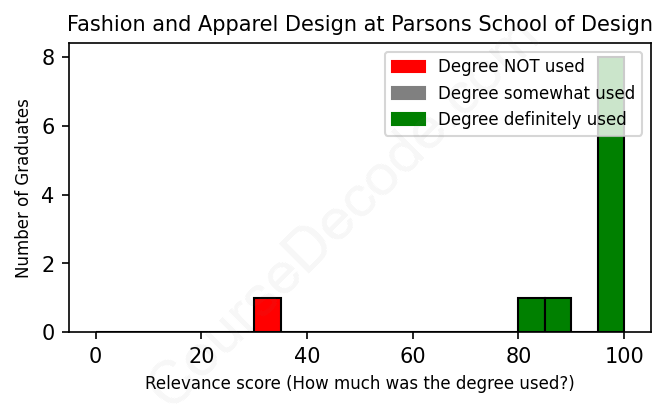
First, some facts. Of the Fashion and Apparel Design graduates from Parsons School of Design we've analyzed , here's how many have used (or NOT used) their degree in their career:

These are estimates based on AI analysis of 11 LinkedIn profiles (see below).
The verdict? Great! Overall, with an average relevance score of 90%, Fashion and Apparel Design graduates from Parsons School of Design have a substantially higher likelihood (+23%) of finding work in this field compared to the average graduate across all fields:
And for comparison, here's the chart for all profiles we've looked at across all degrees.
Also, after graduating, only 0% of these graduates have pursued further education other than another Bachelor's degree (such as a Masters degree or other), compared to the average across all profiles of 35%. This suggests a Bachelors degree is enough for most Fashion and Apparel Design graduates, and it's normal to look for work straight after graduation.
See the details:
|
Relevance score: 97% We think this person has gone into a career highly relevant to their degree. We think this person has gone into a career highly relevant to their degree.
DEGREE INFOGraduated in 2014 from Parsons School of Design with a Bachelor of Fine Arts (BFA) in Fashion and Apparel Design. No other secondary education since. JOB HISTORY SINCE GRADUATIONAssistant Buyer and Sales Henrik Vibskov Boutique May 2014 - Nov 2014 Fashion Designer  Worldwide Apparel Holdings Oct 2014 - Feb 2017 Associate Designer  Hansae Fashion Worldwide Feb 2017 - Present ABOUTNo information provided. |
The top 10 most common jobs done by the graduates we've analyzed (ranked most common to least) are:
After analyzing the LinkedIn profiles of graduates from Parsons School of Design who majored in Fashion and Apparel Design, it’s clear that a large proportion of them have taken up roles directly related to their field. Most commonly, you will find positions like Assistant Designer, Associate Designer, and Designer across various companies, particularly in women’s and men’s apparel. These roles emphasize the skills and knowledge that these individuals developed during their time in school, showcasing a solid connection to fashion design. It seems that many have found careers where they can express their creativity and apply technical design skills, especially with companies like White House Black Market, Vintage Havana, and Bombas. Overall, jobs like these reinforce the relevance of a fashion degree, allowing graduates to thrive in hands-on, creative environments.
However, there are also some graduates who have ventured into roles that don’t directly utilize their fashion design training. For instance, positions like Assistant Buyer and Sales, along with some freelance gigs, show that while some graduates may dabble in fashion-related areas, they aren’t always leveraging the core skills from their degree. These roles might require some knowledge of fashion, but they tend to focus more on sales or administrative tasks rather than hands-on design work. Still, it’s encouraging to see that the general trend for these graduates is to pursue positions that align with their education, ensuring that their career paths are both relevant and fulfilling. So, if you're considering diving into fashion design, know that there’s definitely a mix of jobs out there—many of which will firmly connect you to your passion!
Here is a visual representation of the most common words in job titles for Fashion and Apparel Design graduates (this is across all Fashion and Apparel Design graduates we've analyzed, not just those who went to Parsons School of Design):

Graduates from Parsons School of Design with a degree in Fashion and Apparel Design seem to follow some pretty solid career paths. For many, their first job right out of school tends to be in assistant or entry-level designer roles, where they can get their feet wet and start building experience. A lot of these folks begin as assistant designers and move up to associate or even designer positions within a few years, showing a clear trajectory where they stick with companies or find freelance gigs that help them develop their craft. For instance, several graduates landed roles at well-known brands early on, like White House Black Market and Diane von Furstenberg, and many have continued to climb the ranks in similar companies, taking on more responsibilities and specialized roles over time.
Fast forward about five to ten years after graduation, and you'll find that many of these Parsons alumni have established themselves as designers or have taken on senior roles in various subsectors of the fashion industry. While some might have ventured into different areas like production coordination or even graphic design, a significant number remain within fashion, working as designers or in related fields like merchandising and concept design. This consistency indicates a level of accomplishment that aligns well with their educational background. Overall, it looks like a lot of Parsons grads have hit the ground running and made meaningful contributions to the fashion world, proving that a degree from such a prestigious institution can really open doors in this competitive industry.
Studying for a Bachelor's degree in Fashion and Apparel Design at Parsons School of Design can be pretty challenging, but it's also super rewarding if you're really into it! The program is known for being intense, with a heavy emphasis on creativity, technical skills, and long hours of studio work that can definitely test your dedication. You’ll be juggling projects, learning new techniques, and often facing tight deadlines, which can feel overwhelming at times. However, if you have a passion for fashion and are willing to put in the effort, you'll likely find it to be an amazing and enriching experience that pushes you to grow as a designer. So, while it's not a walk in the park, it can be totally worth it if you love what you do!
Most commonly, in the LinkedIn profiles we've looked at, it takes people 4 years to finish a Bachelor degree in Fashion and Apparel Design.
So, after checking out the career paths of these Fashion and Apparel Design grads from Parsons, it seems like most of them are doing pretty well money-wise. A lot of them have climbed the ladder from positions like assistant or intern to roles like designer or associate designer, which definitely suggests they’ve been pulling in decent salaries, especially at established brands. Fashion design jobs can vary, but if they're sticking around and moving up in companies like White House Black Market or Jill Stuart, they're likely managing a comfortable living. Of course, you’ve got some freelancing mixed in there, which can be hit or miss financially, but overall, it looks like these grads are making better strides than many out there!
Here is a visual representation of the most common words seen in the "about" section of LinkedIn profiles who have a Bachelor degree in Fashion and Apparel Design (this is across all Fashion and Apparel Design graduates we've analyzed, not just those who went to Parsons School of Design). This may or may not be useful:

Here are all colleges offering a Bachelor degree in Fashion and Apparel Design (ordered by the average relevance score of their Fashion and Apparel Design graduates, best to worst) where we have analyzed at least 10 of their graduates:
| College | Score | Count |
|---|---|---|
 Otis College of Art and Design Otis College of Art and Design
|
95 | 11 |
 Parsons School of Design Parsons School of Design
|
90 | 11 |
 Parsons School of Design - The New School Parsons School of Design - The New School
|
89 | 22 |
 Fashion Institute of Technology Fashion Institute of Technology
|
87 | 35 |
 Pratt Institute Pratt Institute
|
79 | 11 |
 Kent State University Kent State University
|
73 | 23 |
 Savannah College of Art and Design Savannah College of Art and Design
|
68 | 22 |
 The Art Institutes The Art Institutes
|
50 | 11 |